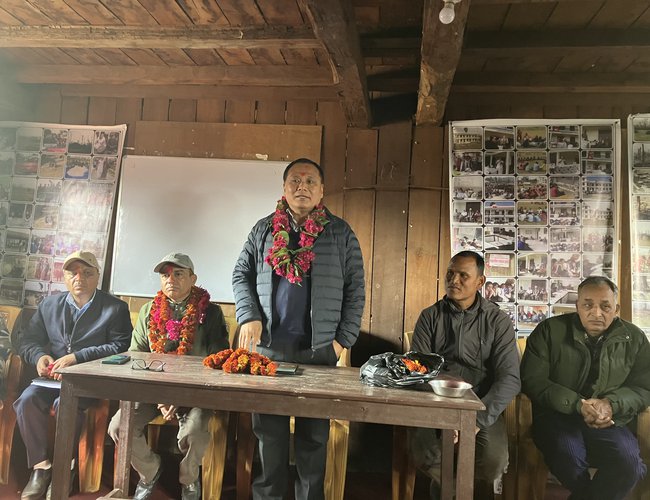
Chitwan's Madi Municipality-9 Bandarjhula (Hanumanjhula) is still without electricity from the national transmissionline, despite Nepal Electricity Authority's commitment to provide it soon.
Two years ago, the Nepal Electricity Authority allocated a budget of 2.5 million rupees for electrification in Bandarjhula and called for a tender.
However, the tender process was halted after the Chitwan National Park Office sent a letter requesting that no plans be carried out to encourage unorganized settlements in its central area or promote encroachment.
According to the Chitwan National Park, no projects should be carried out in the Bandarjhula area without permission. If any unauthorized projects are carried out, action will be taken in accordance with the National Parks and Wildlife Protection Act, 2029, and the Intermediate Area Management Regulations, 2052. Bandarjhula is an area in Bikat of Chitwan that is connected to the thori of Parsa and the Indian border.
The area is home to more than 3,500 people from about 800 households. Nikuncha suggests relocating the settlement due to territorial encroachment. The locals have claimed the land they have lived on since October 2047, and some use solar energy as electricity from the national transmission line is unavailable. Electricity has reached the village of Parsa, located approximately 2 km away.
After seeing the problem of electrification, a team including Executive Director of Nepal Electricity Authority Kulman Ghising, Head of Hetounda Division Office, Head of Chanauli Distribution Center visited Bandarjhula area on Sunday and interacted with the locals.
Ghising, the managing director of the authority, explained that the park could not be electrified during the final stage of the process, even after calling for a tender to allocate the budget for bringing electricity to the Bandarjhula area, due to legal arrangements and procedures.

Executive Director Ghising mentioned that if Bandarjhula's settlement is relocated, the electricity structure will also be removed. The authority is responsible for supplying electricity to residential areas, and preliminary work has already been done to ensure the budget for this.
Ghising emphasized that the state should provide minimum facilities to foreign refugees, but citizens of their own country cannot be deprived of basic facilities like electricity. The decision to relocate the slums is up to the state. In areas with full electrification, citizens living in hot climates should have access to electricity, even if they live in a house or settlement. Ghising stated that if the settlement is relocated, the electricity structure can be moved, and they are committed to bringing electricity to Bandarjhula as soon as possible.
Due to the proposed Nijgadh Second International Airport in Bara, residents of Tangiya Bastiba in Jitpur Simra Sub-Metropolitan City-16 have been living without electricity for years. If the settlement is later removed, the electricity structure will also be removed.
Ghanshyam Duwadi, the Ward President of Madi Municipality-9, requested immediate electrification. The park is not functioning smoothly due to the lack of electricity. However, investments are being made in the development of the Bandarjhula area at the federal, provincial, and local levels.

Banderjhula has a secondary school and two primary schools, an armed police border security post, and a health institution. However, due to the lack of electricity, we are unable to operate the science laboratory at the school and the Worthing Center (maternity house) at the health post. Immediate action is required to connect the electricity.
Dilip BK, a local resident, stated that the residents of Bandarzhula, a village bordering India, worked as plainclothes border guards. However, before the announcement of the intermediate zone, settlements were deprived of electricity facilities under the guise of relocation.
- Green Hydrogen in Nepal: Unlocking a sustainable energy future
- Jul 14, 2025
- Embassy of Nepal in India and PHDCCI India-Nepal Centre Organised “India-Nepal Economic Cooperation Meet 2025
- Jul 14, 2025
- Glacial Lake Outburst Floods Mustang
- Jul 14, 2025
- Weather Forecast: Generally Cloudy Across The Country With Possiblity of Heavy Rain At One Or Two Places In Bagmati, Koshi, Lumbni And Karnali
- Jul 14, 2025
- High-Level Nepali Delegation to Visit Israel and Participate in Muni Expo Conference 2025
- Jul 13, 2025













